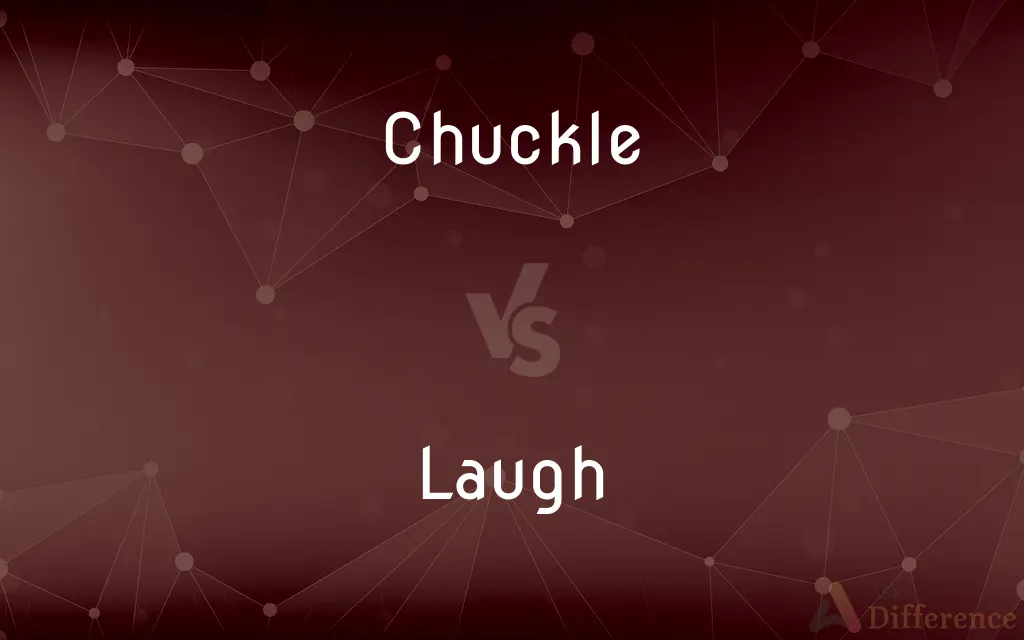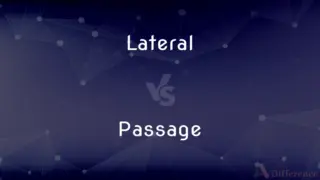Chuckle vs. Laugh — What's the Difference?
By Fiza Rafique & Maham Liaqat — Updated on March 16, 2024
A chuckle is a soft, quiet laugh, often reflecting amusement or mild joy, whereas a laugh is louder, more expressive, and indicates stronger amusement or joy.

Difference Between Chuckle and Laugh
Table of Contents
ADVERTISEMENT
Key Differences
Chuckle is a subdued, often brief laugh that reflects mild amusement, private enjoyment, or a reaction to something amusing in a gentle manner. On the other hand, a laugh is a more vocal and sometimes boisterous reaction to humor, joy, or something perceived as funny, often resulting in a series of loud sounds.
A chuckle is typically controlled, quiet, and may be more personal, reflecting an individual's internal amusement or satisfaction. It's less about sharing the humor with others and more about a personal reaction. Whereas a laugh is usually shared with others, a more open and communal expression of amusement or happiness that can be contagious and invite others to join in.
The context in which one might chuckle versus laugh can vary significantly. Chuckling is common in situations where a full laugh might be inappropriate or too disruptive, such as during a quiet meeting or in a solemn environment. Laughing, however, is often the response to outright humor or joy in a social setting, where the expression of such emotions is encouraged and expected.
The intensity and duration of a chuckle versus a laugh also differ. Chuckling is brief and low-key, perhaps repeated quietly if the amusement continues. Laughing, by contrast, can vary in duration and intensity, from a few loud guffaws to prolonged laughter that is hard to control.
Physiologically, chuckling requires less facial movement and breath control than laughing. A chuckle might involve a slight movement of the shoulders and a quiet sound, whereas laughing engages the diaphragm, facial muscles, and sometimes the whole body, depending on the intensity.
ADVERTISEMENT
Comparison Chart
Volume
Quiet, subdued
Louder, more expressive
Intensity
Mild amusement or joy
Stronger amusement, joy, or hilarity
Context
Often private or in quiet settings
Social, communal, and in response to overt humor
Duration
Brief, controlled
Can be prolonged, varies in intensity
Physical Expression
Minimal facial movement, quiet
Engages diaphragm, facial muscles, often whole body
Compare with Definitions
Chuckle
A soft, quiet laugh that expresses mild amusement.
She let out a gentle chuckle at the clever joke.
Laugh
A louder, more expressive reaction to humor or joy.
His laugh filled the room, infectious and bright.
Chuckle
A low-key, brief laugh, often personal.
A chuckle escaped him as he read the witty email.
Laugh
Engages the body more intensely than a chuckle.
Laughing uncontrollably, he struggled to regain his composure.
Chuckle
A gentle, often brief reaction to humor.
She couldn't help but chuckle at the memory.
Laugh
A response to something funny, ranging from a giggle to a guffaw.
She laughed so hard at the joke, tears streamed down her face.
Chuckle
A subdued expression of amusement or satisfaction.
With a quiet chuckle, he returned to his book.
Laugh
An overt expression of amusement, often shared socially.
Their laughter echoed down the hall, drawing curious looks.
Chuckle
Reflecting amusement without the need for loud laughter.
His chuckle was barely audible in the crowded room.
Laugh
Indicates a higher degree of amusement or joy than a chuckle.
The crowd burst into laughter at the comedian's punchline.
Chuckle
To laugh quietly or to oneself.
Laugh
To express certain emotions, especially mirth or delight, by a series of spontaneous, usually unarticulated sounds often accompanied by corresponding facial and bodily movements.
Chuckle
To cluck or chuck, as a hen.
Laugh
To show or feel amusement or good humor
An experience we would laugh about later on.
Chuckle
A quiet laugh of mild amusement or satisfaction.
Laugh
To feel or express derision or contempt; mock
I had to laugh when I saw who my opponent was.
Chuckle
A quiet laugh.
Laugh
To feel a triumphant or exultant sense of well-being
You won't be laughing when the truth comes out.
Chuckle
To laugh quietly or inwardly.
Laugh
To produce sounds resembling laughter
Parrots laughing and chattering in the trees.
Chuckle
(transitive) To communicate through chuckling.
She chuckled her assent to my offer as she got in the car.
Laugh
To affect or influence by laughter
Laughed the speaker off the stage.
Laughed the proposal down.
Chuckle
To make the sound of a chicken; to cluck.
Laugh
To say with a laugh
He laughed his delight at the victory.
Chuckle
To call together, or call to follow, as a hen calls her chickens; to cluck.
Laugh
The act of laughing.
Chuckle
To fondle; to indulge or pamper.
Laugh
The sound of laughing; laughter.
Chuckle
(obsolete) Clumsy.
Laugh
(Informal) Something amusing, absurd, or contemptible; a joke
The solution they recommended was a laugh.
Chuckle
To call, as a hen her chickens; to cluck.
Laugh
Often laughs(Informal) Fun; amusement
Went along just for laughs.
Chuckle
To fondle; to cocker.
Laugh
An expression of mirth particular to the human species; the sound heard in laughing; laughter.
His deep laughs boomed through the room.
Chuckle
To laugh in a suppressed or broken manner, as expressing inward satisfaction, exultation, or derision.
Laugh
Something that provokes mirth or scorn.
Your new hat's an absolute laugh, dude.
Chuckle
A short, suppressed laugh; the expression of satisfaction, exultation, or derision.
Laugh
A fun person.
Chuckle
A soft partly suppressed laugh
Laugh
(intransitive) To show mirth, satisfaction, or derision, by peculiar movement of the muscles of the face, particularly of the mouth, causing a lighting up of the face and eyes, and usually accompanied by the emission of explosive or chuckling sounds from the chest and throat; to indulge in laughter.
There were many laughing children running on the school grounds.
Chuckle
Laugh quietly or with restraint
Laugh
To be or appear cheerful, pleasant, mirthful, lively, or brilliant; to sparkle; to sport.
Laugh
To make an object of laughter or ridicule; to make fun of; to deride; to mock.
Don't laugh at my new hat, man!
Laugh
(transitive) To affect or influence by means of laughter or ridicule.
Laugh
(transitive) To express by, or utter with, laughter.
Laugh
To show mirth, satisfaction, or derision, by peculiar movement of the muscles of the face, particularly of the mouth, causing a lighting up of the face and eyes, and usually accompanied by the emission of explosive or chuckling sounds from the chest and throat; to indulge in laughter.
Queen Hecuba laughed that her eyes ran o'er.
He laugheth that winneth.
Laugh
Fig.: To be or appear gay, cheerful, pleasant, mirthful, lively, or brilliant; to sparkle; to sport.
Then laughs the childish year, with flowerets crowned.
In Folly's cup still laughs the bubble Joy.
No wit to flatter left of all his store,No fool to laugh at, which he valued more.
Laugh
To affect or influence by means of laughter or ridicule.
Will you laugh me asleep, for I am very heavy?
I shall laugh myself to death.
Laugh
To express by, or utter with, laughter; - with out.
From his deep chest laughs out a loud applause.
Laugh
The sound of laughing
Laugh
A facial expression characteristic of a person laughing;
His face wrinkled in a silent laugh of derision
Laugh
A humorous anecdote or remark intended to provoke laughter;
He told a very funny joke
He knows a million gags
Thanks for the laugh
He laughed unpleasantly at hisown jest
Even a schoolboy's jape is supposed to have some ascertainable point
Laugh
Produce laughter
Common Curiosities
What physical reactions accompany a laugh?
Laughing involves facial expressions, vocal sounds, and can engage the whole body, especially in intense laughter.
What is a chuckle?
A chuckle is a soft, quiet laugh, often reflecting mild amusement or a personal sense of humor.
When might someone chuckle instead of laugh?
Someone might chuckle in situations requiring quiet or subtlety, where a loud laugh would be inappropriate.
Is it possible to control laughter?
While it's possible to try to control laughter, it can be difficult to suppress in situations of genuine amusement or joy.
What role does laughter play in social interactions?
Laughter plays a crucial role in bonding, reducing stress, and enhancing communication and connections among people.
Can someone laugh without being happy?
Yes, laughter can sometimes be a response to nervousness, discomfort, or social conformity, not just happiness.
What is the significance of laughter in relationships?
Laughter is significant in relationships as it fosters closeness, shared joy, and a positive emotional climate.
Can laughter be contagious?
Yes, laughter is often contagious, spreading amusement and joy in social settings.
How do cultural differences affect laughter?
Cultural differences can influence what people find amusing and how openly they express laughter.
Can laughter have therapeutic effects?
Yes, laughter has been shown to have therapeutic effects, including reducing stress, improving mood, and enhancing resilience.
How does a laugh differ from a chuckle?
A laugh is louder and more expressive, indicating a stronger sense of amusement or joy, and is often shared in social settings.
Do chuckles and laughs express the same emotions?
Both express amusement, but chuckles are often for milder humor or satisfaction, while laughs indicate stronger amusement or joy.
Why do people laugh at jokes?
People laugh at jokes as a natural response to humor, which triggers a sense of amusement or happiness.
Is chuckling considered a form of laughter?
Yes, chuckling is considered a form of laughter, though it is quieter and less intense than full laughter.
Why might someone prefer to chuckle in certain environments?
Someone might prefer to chuckle in environments where discretion is valued or to keep their amusement more private and contained.
Share Your Discovery

Previous Comparison
Improve vs. Grow
Next Comparison
Lateral vs. PassageAuthor Spotlight
Written by
Fiza RafiqueFiza Rafique is a skilled content writer at AskDifference.com, where she meticulously refines and enhances written pieces. Drawing from her vast editorial expertise, Fiza ensures clarity, accuracy, and precision in every article. Passionate about language, she continually seeks to elevate the quality of content for readers worldwide.
Co-written by
Maham Liaqat













































